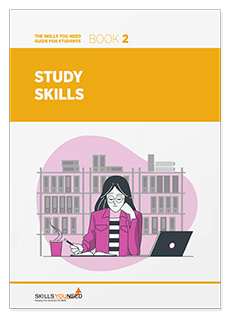Essential Skills All Graduate Students Need
See also: Employability Skills for GraduatesThere are dozens of good reasons to pursue a graduate degree. For students on the verge of graduating with a bachelor’s, a master’s degree can provide extra knowledge and skills to skip entry-level career positions and start a career at a higher level. For workers in industry who are tired of their current role or opportunities, a master’s or PhD can be the necessary qualification to pivot into new career fields that provide a greater sense of purpose and job satisfaction.
Yet, regardless of your current circumstances and the reasons driving your interest in a graduate degree, you need to consider whether you have what it takes to survive and thrive in a graduate degree program.

The following skills are absolutely essential for any graduate student, so you might work toward cultivating them before you apply:
Communication
The number-one most important skill for anyone in any field is communication. As a social species, humans will inevitably interact with one another, and strong communication skills ensure that those interactions are successful for all parties involved. Graduate students will need to communicate with instructors, fellow students, school administrators and perhaps research participants. The most important component of communication is the ability to actively listen to others, and graduate students can practice this skill in their personal and professional lives before enrolling in their graduate program.
Adaptability
Change is the only constant through a graduate degree program. Often, graduate students begin their programs intending to focus on a specific field of study only to pivot several times to new fields and topics. This can occur because a student develops new academic interests or because their target field shifts due to a new trend or discovery. Sometimes, guiding faculty will leave, compelling students to find new connections to their field of choice. Regardless, graduate students need to be able to adapt to new situations with relative ease, or else they will be continuously frustrated in their advanced program.
Discipline
In professional settings, workers are kept on task thanks to the careful supervision of managers. In academic settings, it is the student alone who is responsible for their studies; though professors and academic counselors might offer guidance, they cannot oversee every step of every student’s study process. Thus, students need to have the discipline to motivate and manage themselves through the hard work required to obtain a graduate degree. Especially with the highest degrees, like a PhD in education, students should have strong self-direction and follow-through to ensure they will complete their programs with high-quality work in a reasonable time frame.
Intellectual Maturity
To put it bluntly, graduate students need to be smart. Information taught at the graduate level tends to be sophisticated and abstract, and students will need to have methods of learning and retaining an abundance of information in a brief period of time. Students should strive to develop skills that will drive intellectual maturity, like curiosity, before enrolling in their program, so they can push their intellectual abilities to the maximum during their graduate studies.
Teamwork
Even though you may have made it through college by staying to yourself and focusing only on your studies, mastering teamwork will be crucial to your success in the real world. Most professions need contact and collaboration, and you can be the most qualified person with this quality.
Managing Time Efficiently
The worst that can happen if you oversleep and miss a class while in college is that you'll have to make up for it later. In the working world, this isn't the case! It's possible that being late for work may result in losing your job for good. During your final year of college, make a conscious effort never to be late for an appointment - this will ease your transition.
Perspective and Empathy
Even though this ability has always been crucial, it appears to be steadily vanishing. It will help the students to empathize with others, comprehend their sentiments, and offer solutions to their issues.
Innovation and Creativity
This talent is essential because it coincides with the capacity for thoughtful inquiry and problem-solving. Employers increasingly rely on workers to develop original and inventive answers to problems.

Other Important Skills
All graduate students need the above soft skills to find success in their graduate programs, but most graduate students also need a certain number of hard skills before they will be able to navigate the demanding coursework of their graduate studies. Some of these valuable hard skills include:
Data Analysis
Most graduate-level studies involve some degree of research, and research always requires collecting and analyzing data. It might be worthwhile for prospective graduate students to take individual introductory data science courses online or at a local college to establish a foundation in skills like data analysis and visualization.
Writing
Every graduate program involves an abundance of writing. Some students mistakenly believe that writing is an inborn talent, but in truth, it is a skill that can be improved through practice. Before a graduate program begins, students might experiment with different strategies for improving their writing skills, such as completing Morning Pages or reading more often throughout the day.
Self-care
Admittedly, self-care is not a hard skill — but it is essential for surviving and thriving in graduate school. Students need to have systems in place to ensure that they are eating healthily, exercising regularly and socializing appropriately to feel balanced and secure. It might be useful for students to develop a self-care plan before beginning any graduate program.
A graduate degree can be an immensely valuable tool for boosting one’s career — but graduate school is not for everyone. Professionals who have the above skills, or who are willing to work to obtain them before beginning their graduate studies, are more likely to see success from a completed advanced credential.
Software Skills
The fact that knowledge of computers and software is more important than ever is reflected with time. The more proficient you are in these areas from the outset, the more successful and quickly moving your career will likely be. Nowadays, virtually all well-paying graduate professions need digital skills.
Money Management
All graduate students should be able to handle money, balance a checkbook, use an ATM, read a bank statement, and understand how to make intelligent financial decisions.
Further Reading from Skills You Need
The Skills You Need Guide to Getting a Job
Develop the skills you need to get that job.
This eBook is essential reading for potential job-seekers. Not only does it cover identifying your skills but also the mechanics of applying for a job, writing a CV or resume and attending interviews.
Final Words
College may be the most enjoyable years of a person's life, offering enjoyment, independence, and valuable education that supports your pursuit of the vocation of your dreams.
But for many recent graduates, leaving the familiarity of college and entering the real world may be a terrifying experience. They may be qualified for specialized occupations, but to accept and adapt to this new, fully-adult existence, they must also have learned and mastered several vital practical life skills.
We have therefore compiled this list of the most important skills everyone should have acquired before graduating college.

About the Author
Adil Altaf loves to help others by sharing useful information and seeing how informed decision-making can change the world.


